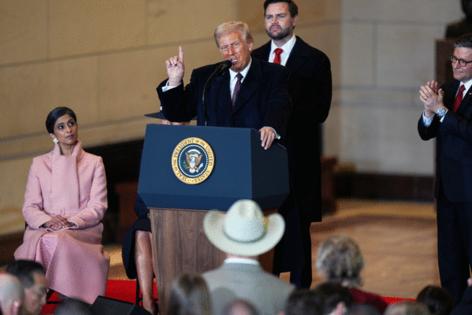Trump orders US exit from Paris pact, hobbling climate fight
Published in Political News
WASHINGTON — President Donald Trump ordered the U.S. to withdraw from the landmark Paris Agreement, launching another retreat in the global fight against climate change by the world’s wealthiest nation.
The move was widely expected since Trump pulled the U.S. from the emissions-cutting pact during his first term and had vowed do to it again during his campaign. Nevertheless, the decision to initiate the action hours after his inauguration underscored the seriousness of the Republican’s commitments to rapidly overhaul U.S. energy and climate policy.
“I’m immediately withdrawing from the unfair, one-sided Paris climate accord ripoff,” Trump said, before signing a letter notifying the United Nations that the U.S. intends to leave the agreement. “The United States will not sabotage our own industries while China pollutes with impunity.”
The exit from the Paris Agreement is just one of a number of changes Trump initiated on his first day back in the White House, as he shifts U.S. policy toward promoting fossil fuel production and away from fighting climate change. In his inaugural address, Trump vowed that his actions Monday “will end the green new deal.”
The departure of the U.S. from the Paris Agreement isn’t expected to be immediate. Signatories to the 2015 accord can initiate a withdrawal by sending a formal notice to the U.N, and then need to wait a year for it to take effect.
Even so, just the specter of the U.S. exit had already shaken global climate diplomacy, casting a shadow over the last round of annual U.N. talks at the COP29 summit in Azerbaijan last November.
The U.S. is the second-largest emitter of greenhouse gases — behind top polluter China — and had been viewed as offering crucial leadership in the fight to curb planetary warming. The decision by Trump to step back revives long-simmering questions about whether a three-decades-long international framework for fighting climate change is up to the task.
Environmentalists excoriated Trump’s decision, saying the U.S. was shirking its responsibility to contend with global warming while ignoring the economic dividends tied to U.S. development of emissions-free power and clean energy technology.
“The transition to a low-carbon economy is already underway,” said Ani Dasgupta, president of the World Resources Institute. “Walking away from the Paris Agreement won’t protect Americans from climate impacts, but it will hand China and the European Union a competitive edge in the booming clean energy economy.”
Analysts, negotiators and veterans of climate diplomacy have predicted the latest U.S. departure could shift the balance of power to other countries and blocs. That includes emboldening China, which has installed renewable energy capacity at a record scale — and is exporting emissions-free energy technology to other nations — despite its long embrace of coal power.
European climate leaders sounded a defiant note, insisting the U.S. withdrawal won’t impede global action.
“Multilateral climate action has proven resilient and is stronger than any single country’s politics and policies,” said Laurence Tubiana, a key architect of the Paris Agreement who is now chief executive officer of the European Climate Foundation.
Beyond jettisoning the Paris Agreement, Trump has vowed to undo an array of federal policies critical for the U.S. to meet its emission-cutting pledges, including a promised 50% to 52% reduction from 2005 levels by the end of the decade.
Business and local government leaders say they will continue to seek to cut emissions and encourage carbon-free energy. But analysts insist those private sector and subnational efforts can’t be sufficient without robust federal action.
Opponents of U.S. participation in the Paris Agreement championed Trump’s move, saying the pact has dragged down the economy and allowed others to dictate the nation’s energy future, even as those countries fail to meet their own carbon-cutting targets.
Trump said the U.S. would “save over a trillion dollars” by withdrawing from the pact.
Supporters of the Paris accord — including business leaders and Republicans who unsuccessfully encouraged Trump to stick with the pact in 2017 — have argued the U.S. would be better off wielding its leverage to better influence global climate talks, potentially helping propel American energy exports, including natural gas that burns more cleanly than coal when used to generate power.
Indeed, the Trump administration played a kind of spoiler role during the president’s first term, as the initial Paris exit was still pending, by championing fossil fuels in annual negotiations.
The actual U.S. exit last time was brief, only taking effect Nov. 4, 2020, because of a longer waiting period to make it official. Former President Joe Biden moved to reenter the accord immediately after his inauguration in January 2021.
It’s relatively easy for a U.S. president to unilaterally walk away from the Paris Agreement, which has been considered an executive agreement that relies on existing U.S. statutory authority, not a treaty. U.S. negotiators at the 2015 climate conference in Paris even worked to ensure the document referred to certain actions that “should” — not “shall” — be taken in order to ensure there’d be no need for a Senate vote to give advice and consent.
_____
©2025 Bloomberg L.P. Visit bloomberg.com. Distributed by Tribune Content Agency, LLC.




























































Comments